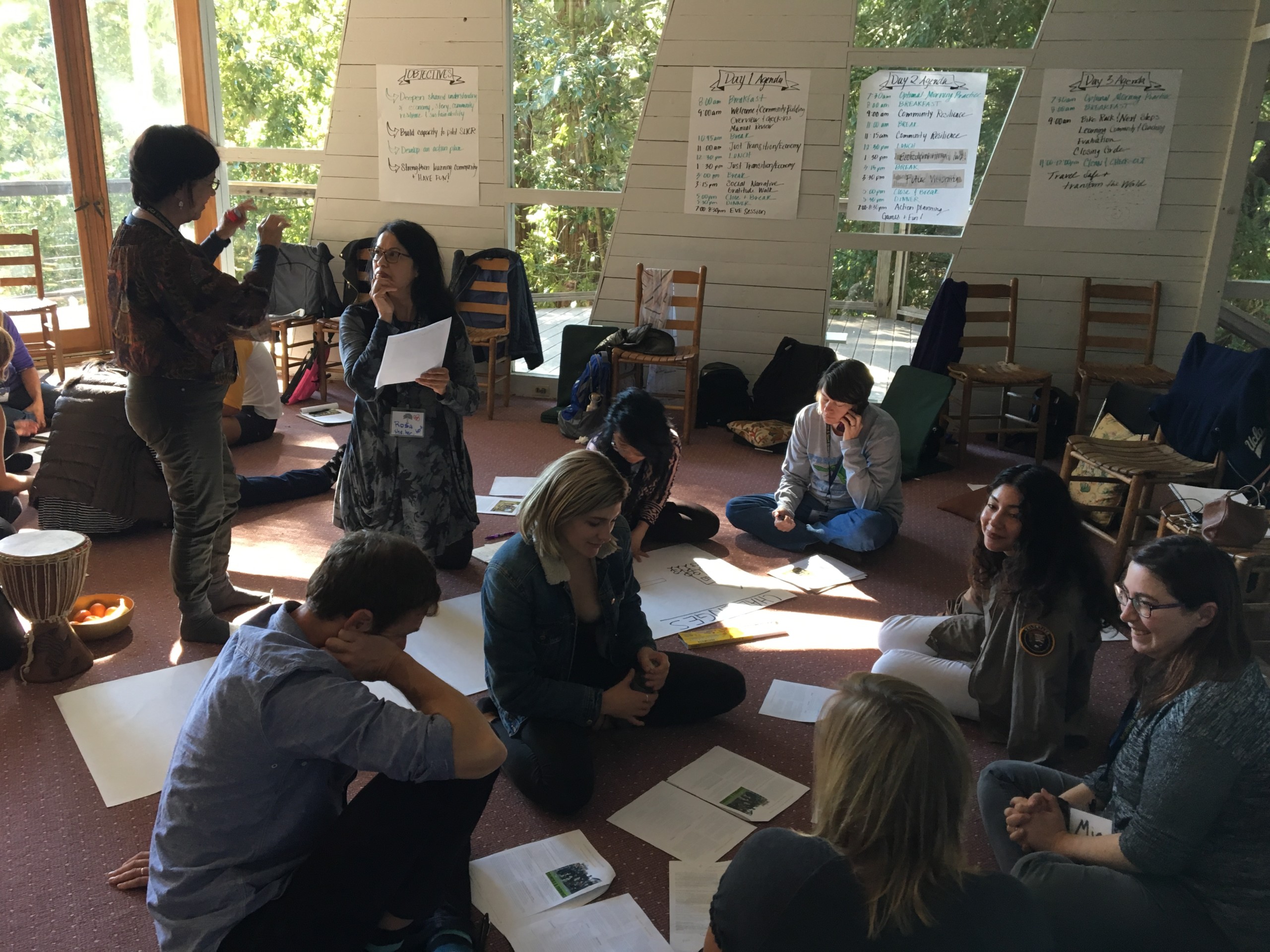Community Resilience Co-Lab
The Center for Black Cultures, Resources & Research; the Cross-Cultural Center; the Global Sustainability Resource Center; and the Student Housing Sustainability Program are collaborating to build community resilience at UCI. The Community Resilience Co-lab is an experimental co-curricular education response to the enduring and intersecting crises of environmental, racial, and social injustice. This nexus lies at the heart of contemporary crises such as the Flint, Michigan, drinking water emergency; the Standing Rock Sioux mobilization for water protection; the Movement for Black Lives; the global migration crisis; and the current Presidential Administration’s unconventional approaches to environmental protection and social issues.
Our collaboration asks: “What does it take to move from a world rooted in violence, extraction, and domination to a world rooted in regeneration, resilience, and interdependence?” The Community Resilience Co-lab begins to answer this question first by building human infrastructure here at UCI to integrate campus networks and resources at this intersection. By deepening and strengthening the intellectual and community relationships among students, staff, and faculty who participate in these networks, we aim to create fertile ground for communal care and resilience.
Over time, the Community Resilience Co-lab seeks to advance a coalition that mobilizes student capacity towards engagement, inspires exchange among a diverse cohort of activists and healers, lifts up cultural relationships to the earth, and educates at the intersections of environmental, racial, and social justice issues. Our invitation for collaboration extends broadly to student leaders, staff, faculty, and community members who are engaged in work for racial and social equity and/or sustainability.
To get involved in the Co-lab, please complete the interest form here.
Fellowship Opportunity
The Co-lab is hiring two UCI students to serve as Community Resilience Fellows. The Fellows will work together and with faculty, staff, and students affiliated with the Center for Black Cultures, Resources, and Research; the Cross Cultural Center; and the Global Sustainability Resource Center to develop and carry out Community Resilience Co-lab activities. Activities include catalyzing a rich campus conversation, fostering alignment, and building campus momentum to address actively the root causes of environmental, social, and racial injustice. The Fellows will support co-lab participants in designing a range of actions that build community resilience, including mobilizing student capacity to reclaim and create systems and cultures of collective action that lift up cultural relationships to the earth and land.
This fellowship is a hands-on, experiential learning opportunity to develop and practice a range of skills essential to building community resilience in the context of our campus’s climate and sustainability goals. The fellowships are funded through the UC Carbon Neutrality Initiative and administered through the UCI Global Sustainability Resource Center. One fellow will be placed at the Cross-Cultural Center and one fellow will be placed at the Center for Black Cultures, Resources, and Research. The Community Resilience Fellows will join a cohort of fellows from across the UC as part of the UC Carbon Neutrality Initiative, which is improving the university’s energy efficiency, developing new sources of renewable energy and enacting a range of related strategies to cut carbon emissions with broad participation from faculty, staff, and students.
The fellowship application deadline has passed.
Application, Selection, and Notification
The organizing and selection committee is comprised of staff at the Cross-Cultural Center; Center for Black Cultures, Resources, and Research; and the Global Sustainability Resource Center. The application deadline has passed. The selection and notification process is currently underway.
Fellowship Details
Each fellowship runs from April 10 – June 30, 2017. The possibility to extend through summer and AY 2017-18 will be determined on a case-by-case basis.
Each fellow will receive:
– Hands-on, project-based experience in the fellowship area
– Approximately $1,600 in the form of a paid internship
– Campus and university-wide recognition as a member of a select group of student leaders
– An opportunity to convene in person with carbon neutrality and food fellows from across the UC system at the end of the fellowship quarter
– An opportunity to participate in a campus or system-wide student visioning and action planning process on climate change and food issues
– Guidance from prominent scholars and mentorship from practitioners in the field.
In return, each fellow is expected to:
– Contribute approximately 10 hours per week to the fellowship during Spring Quarter 2017
– Attend one fellows’ study break during Spring Quarter
– Write at least one blog post for select social media platforms
– Create at least one additional way to engage at least 20 additional members of the campus community in the fellowship project
– Complete work products specific to the fellowship project by June 30, 2017
– Write a short final report by June 30, 2017.
Fellows are expected to participate in the following system-wide activities:
– Participate in a symposium and poster presentation held in conjunction with the CA Higher Education Sustainability Conference (CHESC) at UCSB on June 26, 2017
– Participate in monthly conference calls
Eligibility
UC Irvine undergraduate and graduate students in good standing from any discipline are eligible and encouraged to apply. The $1,600 award is distributed in the form of a paid internship with the Global Sustainability Resource Center. Applicants who are currently employed on campus are advised to assess how the award may interact with existing employment commitments. Graduate student applicants are required to submit a short, signed statement from your faculty adviser acknowledging your intention to pursue this opportunity.




